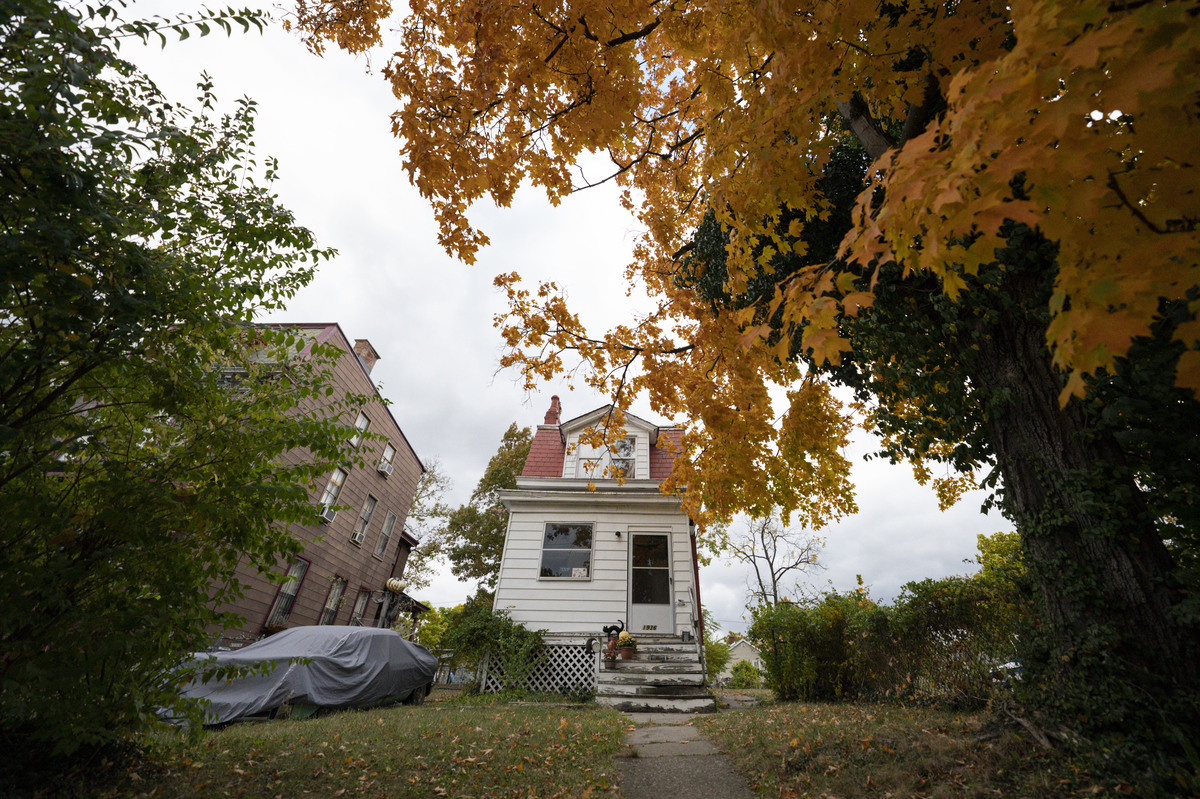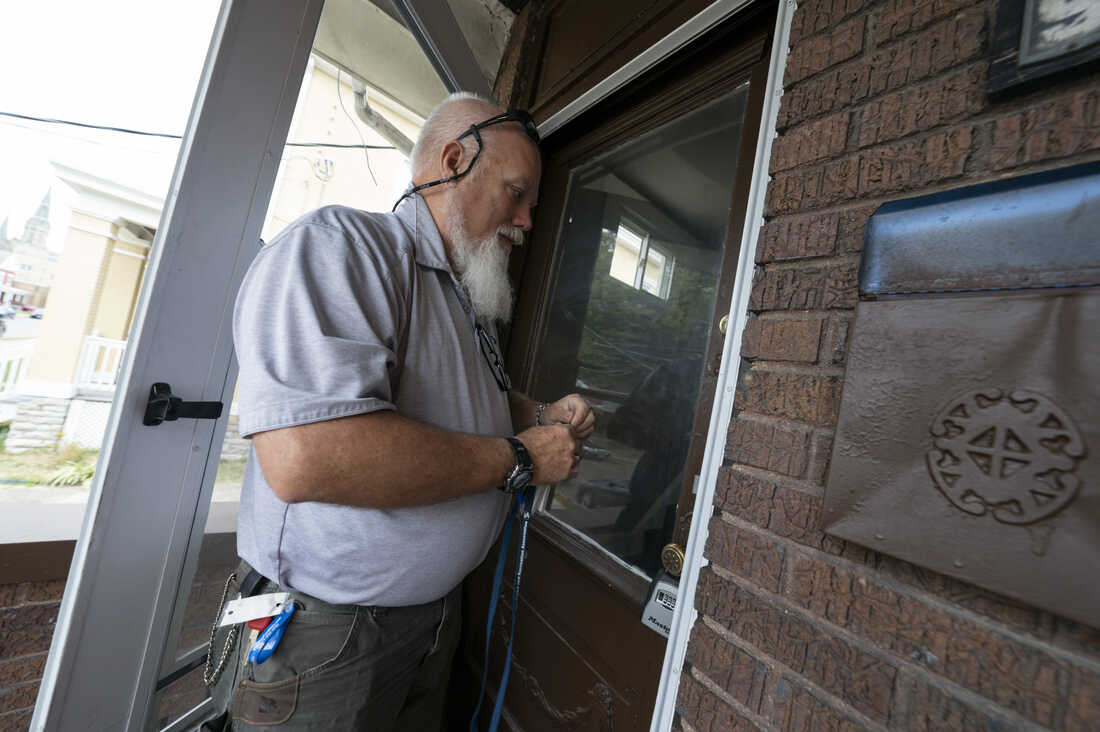
This is one of 194 homes The Port of Greater Cincinnati Development Authority bought this year. The purchase is a first for the agency, which wanted to prevent investors from buying the homes and possibly increasing rent or evicting tenants.
Jeff Dean for NPR
hide caption
toggle caption
Jeff Dean for NPR

This is one of 194 homes The Port of Greater Cincinnati Development Authority bought this year. The purchase is a first for the agency, which wanted to prevent investors from buying the homes and possibly increasing rent or evicting tenants.
Jeff Dean for NPR
CINCINNATI — Demetrius Harper-Edwards and his girlfriend, Sarai Yisrael, spent the pandemic lockdown dreaming of owning a home. They saved for a down payment, and worked to repair their credit.
“I was literally on that couch just going crazy with the paperwork,” says Yisrael, who was pregnant with their now 2-year-old son. Harper-Edwards also has twin 8-year-old daughters.
She’s a seamstress and sells her own designs; he’s a carpenter. Yisrael says buying a place would be especially meaningful for her, since as far as she knows no one in her family ever has.

Demetrius Harper-Edwards stands on the porch of the home he’s renting in Cincinnati. He and his girlfriend hope to be among the first to buy their home from the local public agency that is their new landlord.
Jeff Dean for NPR
hide caption
toggle caption
Jeff Dean for NPR
“My mom and my grandmother, they were actually born in Alabama,” Yisrael says. She assumes their ancestors were slaves, and says homeownership would “change the face of our family. … It means that I can leave a place for my children. It can take some stress off of my children’s shoulders.”
Of course, home prices skyrocketed during the pandemic, worsening a long-term shortage of affordable housing. Now higher mortgage rates and inflation are putting ownership out of reach for many.
But this year the couple’s dream suddenly got more real, when they received a letter saying the house they’ve rented for four years had changed hands.
It was among 194 homes owned by a California-based investment firm that had gone under. Now, the letter explained, a local development agency was their new landlord and it wanted to help them buy the house.
“So it’s just the universe playing out,” Harper-Edwards says. “Like OK, you want your shot, here it is.”
It’s a risky bid to take on the racial wealth gap
The owner of the homes is The Port of Greater Cincinnati Development Authority, known as The Port. It’s run by Laura Brunner, who says she was shocked last year when her staff discovered — after months of digging — that institutional investors own at least 4,000 houses in the county.

In Cincinnati, only 33% of Black residents own a home, a yawning racial gap that a local development agency wants to narrow.
Jeff Dean for NPR
hide caption
toggle caption
Jeff Dean for NPR
Most of those houses were bought for cheap after the 2008 housing crash, then turned into rentals. This national trend picked up pace through the pandemic, with institutional investors buying a record share of single-family homes — more than a third of sales in some cities.
Brunner says this threatens to exacerbate the racial wealth gap in Cincinnati, where only a third of Black residents own homes. Here and nationwide, most investor home purchases are in low- to moderate-income and minority neighborhoods.
“They’re taking a significant amount of inventory off the table and saying people don’t get to own homes anymore,” she says. “So they’re really capturing them as renters.”
Brunner says large investors are also more likely to raise rents, evict tenants and let houses fall into disrepair. She accuses them of treating local properties “like a cash cow,” extracting profits but not investing enough to properly maintain them.

Laura Brunner is president and CEO of the Port of Greater Cincinnati Development Authority. She calls the rise of institutional real estate investment a “predatory practice” that makes it harder for low-income and minority residents to buy an affordable home.
Jeff Dean for NPR
hide caption
toggle caption
Jeff Dean for NPR
So when that California company, Raineth Housing, went under, the Port moved to buy up its properties scattered around Cincinnati. It’s a first — she doesn’t know of any other public agency like hers in the U.S. that’s done it — and it’s risky.
Brunner says the agency outbid 12 other investors, taking on $14.5 million in debt for those 194 homes. It has since paid $2 million more toward fixing them up.
“If we have a chance to fight back on this really predatory practice, there was no question that we had to do it,” she says.
Rental housing investment is a booming business
Nationally, large investors own just a sliver of the market, says David Howard, executive director of the National Rental Home Council. He rejects the notion that the industry is predatory and says it’s responding to a need for rental housing, especially with inflation and higher interest rates making it more difficult for many to buy a home.

A home recently purchased by The Port of Greater Cincinnati Development Authority.
Jeff Dean for NPR
hide caption
toggle caption
Jeff Dean for NPR
“We’re entering a period of time where I believe there will be greater demand for rental housing,” Howard says, “and I think the industry has an important role to play.”
Real estate investing has been a booming business through the pandemic, as skyrocketing home prices forced many to keep renting and average rent reached a record high. But analysts say the growing share of investor-owned homes has helped push out first-time buyers.
Partly in response to such criticism, Howard says some investors are starting to help tenants who want to become owners by, for example, reporting on-time rental payments and sponsoring financial literacy classes.
It’s a challenge to fix up homes and keep sales prices low
The Port’s purchase price per home averages out to roughly $78,000. But the amount it will sell them for depends on how much it has to spend to fix them up. And once the agency was able to look inside all 194 homes, it was clear many needed a lot more work than expected.

Ron Shouse is facilities manager with The Port of Greater Cincinnati, in charge of rehabbing 194 homes the agency bought after an investor landlord went under. He enters one of the homes that had been vacant but is now ready to rent or sell.
Jeff Dean for NPR
hide caption
toggle caption
Jeff Dean for NPR

A contractor for The Port repairs a saggy wood floor that’s rotted through in places. The home had been vacant for about a year and is thought to have flooded after pipes froze.
Jeff Dean for NPR
hide caption
toggle caption
Jeff Dean for NPR
Facilities manager Ron Shouse offers a tour of a rehab underway at a one-level, three-bedroom house. In the kitchen, a contractor is pulling up nails from a saggy wood floor with a large hole. The house was vacant, and Shouse thinks it flooded after pipes froze.
“Floor’s rotten,” Shouse says. “Pulled it up, it’s more rotten than we thought. Cabinets are rotten.” His original estimate for repairs was $10,000, but that will go up to include things like new cabinets.
…
Read More:Inside one city’s plan to outbid investors and keep homes affordable : NPR
2022-11-03 09:00:40




